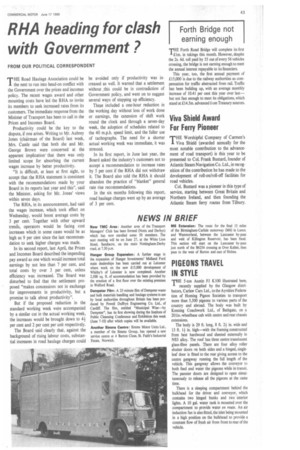• RHA heading for clash with Government ?
Page 45

If you've noticed an error in this article please click here to report it so we can fix it.
FROM OUR POLITICAL CORRESPONDENT
THE Road Haulage Association could be the next to run into head-on conflict with the Government over the prices and incomes policy. The recent wages award and other mounting costs have led the RHA to invite its members to seek increased rates from its customers. The immediate response from the Minister of Transport has been to call in the Prices and Incomes Board.
Productivity could be the key to the dispute, if one arises. Writing to Mr. Aubrey Jones (chairman of the Board) last week, Mrs. Castle said that both she and Mr. George Brown were concerned at the apparent implication that there was only limited scope for absorbing the current wages increase by better productivity.
"It is difficult, at least at first sight, to accept that the RHA statement is consistent with the recommendations made by your Board in its reports last year and this", said the Minister, asking for Mr. Jones' views within seven days.
The RHA, in its announcement, had said the wages increase, which took effect on Wednesday, would boost average costs by 3 per cent. Together with other upward trends, operators would be facing cost increases which in some cases would be as high as 9 per cent since the last recommendation to seek higher charges was made.
In its second report, last April, the Prices and Incomes Board described the impending pay award as one which would increase total earnings by not less than 7 per cent, and total costs by over 3 per cent, unless efficiency was increased. The Board was disturbed to find that the settlement proposed "makes concessions not in exchange for improvements in productivity, but a promise to talk about productivity".
But if the proposed reduction in the standard working week were accompanied by a similar cut in the actual working week, the increases would be brought down to 4+ per cent and 2 per cent per unit respectively.
The Board said clearly that, against the background of rising labour costs, substantial increases in road haulage charges could be avoided only if productivity was increased as well. It warned that a settlement without this could be in contradiction of Government policy, and went on to suggest several ways of stepping up efficiency.
These included a one-hour reduction in the working day without loss of work done or earnings, the extension of shift work round the clock and through a seven-day week, the adoption of schedules related to the 40 m.p.h. speed limit, and the fuller use of tachographs. The need for a shorter actual working week was immediate, it was stressed.
In its first report, in June last year, the Board asked the industry's customers not to accept a recommendation to increase rates by 5 per cent if the RHA did not withdraw it. The Board also told the RHA it should abandon the practice of "blanket" general rate rise recommendations.
In the six months following this report, road haulage charges went up by an average of 3 per cent.




















































































































































